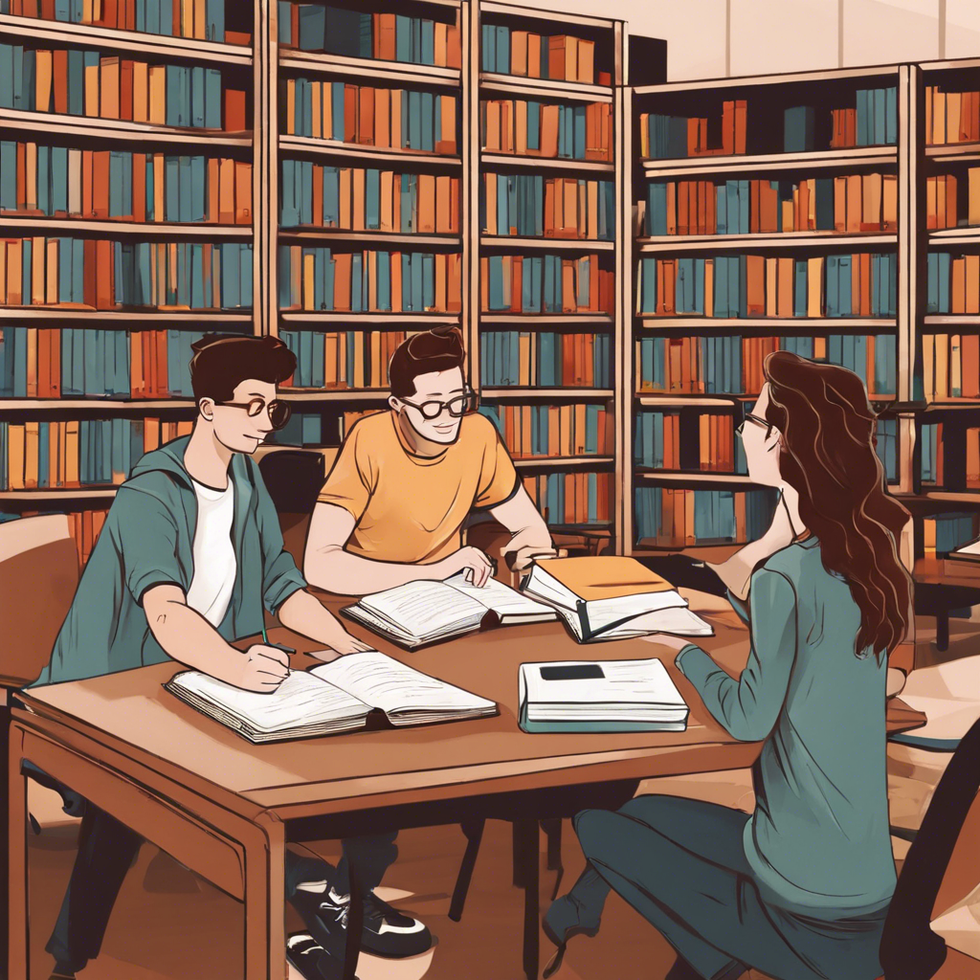We can reveal that graduates in London are hiring paying forprivate online business tutoring to help them get City jobs at top finance corporations. Adults who were tutored as youngsters and in university are increasingly using the services to get a head start on their careers before changing companies or interviewing internally for a promotion.
Grads in the UK will typically pay more than $150 per hour for tutoring in job interview techniques, assessment days, psychometric screening, CV-writing, and elocution lessons now that the boom in private tuition has reached the City. Tutors have become "lifestyle add-ons" for UK families of all ages. Parents employ them even if their children are not having academic difficulties. Students who thrive will continue to use the programmes as they grow older.
Spires Online Tutors Managing Director, Nick Green, claimed that, in addition to the standard 11 Plus, GCSE, and A-level tuition, his organisation receives regular requests for tutors specialising in accountancy certifications such as ACCA and also ACA- tests that staff with top firms such as PWC and Deloitte must complete.
Spires, which has well over 1000 tutors with exceptional academic backgrounds, also offers tuition in the GMAT test, which is required for admission to MBA programmes, the APC (Assessment of Professional Competence) required to eventually become a chartered land surveyor, and critical thinking used in psychometric screening. In addition to training for any other recognised chartered certification.
"Job applicants want to truly impress their prospective employers during an interview, and the job market is becoming increasingly competitive in the present environment." We've observed this in both the increase in requests for help finding jobs and in tutoring requests for those who are already working but want to advance in their professions." Nick elaborates.
"Students who have worked with us at the A-Level and undergraduate levels are also more inclined to seek our help when looking for a job and when working. Our clients do not rely primarily on tuition programmes; they just want to keep ahead of the competition and succeed at whatever they do."
Maria McKenzie, 45, a tutor from London, often advises clients preparing for interviews at companies such as Goldman Sachs and PwC. Using her experience as a financial accountant in the United Kingdom, Russia, and Taiwan, including over 8 years with Deloitte and PwC. I took a career break for maternity leave with my two children some years ago, at which time I began teaching, and I've never looked back.
Ms McKenzie stated that it is "fair game" for applicants to pay for interview coaching, adding, "Twenty years ago, you would have had a one-on-one interview, and today you have a full variety of activities where they are monitoring every move you make."
"We go over probable questions they will get and how to highlight their strengths and shortcomings and present them more effectively," she generally works with young people heading to their first interviews for positions at financial institutions.
The majority of the professionals Maria coaches had tutors during their school and university years. "The employment market is extremely competitive, and individuals are anxious and too enthusiastic." I just aim to help individuals feel more at ease and secure in themselves, their talents, and their experience."
We've previously written on concerns that private tutors are becoming "intellectual crutches" for certain youngsters, leaving them to struggle later in life without them. This tendency appears to support that point of view.
However, as Nick points out, "a tutor who prioritises the student's independence would encourage them to regard the tutor as a resource, rather than a foundation or, if you will, a support-system." The tutor should be an expert of their topic and assist the student in seeing themselves as a master in training.
"Tutoring doesn't have to be a crutch," Nick adds, "and clientele will normally require that tutors establish high expectations for their students, encourage them to take responsibility, and give tools for building self-reliance."
A tutoring service with a comprehensive coaching component can provide students with critical life skills such as confidence, self-management, initiative, planning, and perseverance, which will encourage independence in both academic and professional life. Inquire with tutors about how their service satisfies these demands so that, in the end, the outputs will be valuable in all aspects of the students' lives, regardless of age."
Everything seems to be very insightful. So, let's go over some frequent cases in which an interview coach could be a good fit:
Interviews are intimidating to the candidate: It's normal to start feeling apprehensive before an interview. It indicates that a person is interested in the opportunity and has a real desire to succeed. If anxieties make it difficult to talk properly and act naturally during an interview, consult with an interview coach. They can teach you how to relax and calm down before meeting with an employer.
The applicant has not received any job offers: Those employment offers might be jeopardised if you lack interviewing abilities. An interview coach can identify areas for development and assist in the development of these abilities. When a person improves their interviewing skills, they may be able to find more job opportunities.
The candidate has an excellent opportunity: If a "dream job" chance shows up, an interview coach may be required. Making an extra effort to prepare can help you make a big impression on a top employer.
The person has never had an interview or hasn't had one in a long time: If you've been in the same place for a long period, you may not have had an interview in a lot of years. An interview coach can help people wishing to change careers refresh their interview skills.
The individual is confronted with the following employment obstacles: Significant gaps between jobs, a criminal record, or a history of job-hopping are all common employment hurdles. Assume you believe your personal situation will make it difficult for you to find work. In that instance, an interview coach can assist people who believe their personal circumstances makes it difficult to get work. For example, if a candidate was dismissed from their previous position, an interview coach might offer constructive methods to approach this in an interview.
The candidate is having difficulty negotiating job offers: If a person is having difficulty negotiating for the money or perks they believe they are entitled to, an interview coach can assist in developing persuasive skills. They may empower a person by providing useful advice and strategies. Hiring a coach can pay for itself if it helps you earn a greater wage.
The applicant is moving industries, sectors, or fields and is finding it difficult to sell skills: When you change industries, it might feel like you're starting from zero. However, practically everyone possesses transferrable abilities that will benefit them in any career. Interview coaches can assist in identifying and celebrating transferrable qualities in a variety of ways that most of us have never considered.
The best method to get the City job you want is to make sure you're well prepared for the interview and that your interview technique is professional and polished. This may be difficult without the correct assistance, so you might want to look into business tutors to help you prepare for the next step of your career.
Welcome back
Sign in to comment to your favorite stories, participate in your community and interact with your friends
or
LOG IN WITH FACEBOOKNo account? Create one
Recommended for you
Report this Content
This article has not been reviewed by Odyssey HQ and solely reflects the ideas and opinions of the creator.
Subscribe to our
Newsletter
Lifestyle
The Great Christmas Movie Debate
"A Christmas Story" is the star on top of the tree.
7h
622
Mental Floss
One staple of the Christmas season is sitting around the television watching a Christmas movie with family and friends. But of the seemingly hundreds of movies, which one is the star on the tree? Some share stories of Santa to children ("Santa Claus Is Coming to Town"), others want to spread the Christmas joy to adults ("It's a Wonderful Life"), and a select few are made to get laughs ("Elf"). All good movies, but merely ornaments on the Christmas tree of the best movies. What tops the tree is a movie that bridges the gap between these three movies, and makes it a great watch for anyone who chooses to watch it. Enter the timeless Christmas classic, "A Christmas Story." Created in 1983, this movie holds the tradition of capturing both young and old eyes for 24 straight hours on its Christmas Day marathon. It gets the most coverage out of all holiday movies, but the sheer amount of times it's on television does not make it the greatest. Why is it,
then? A Christmas Story does not try to tell the tale of a Christmas miracle or use Christmas magic to move the story. What it does do though is tell the real story of Christmas. It is relatable and brings out the unmatched excitement of children on Christmas in everyone who watches. Every one becomes a child again when they watch "A Christmas Story."
Everyone has experienced the feeling of wanting one thing for Christmas more than anything else in the world. For the young Ralphie Parker, played by Peter Billingsley, this gift is the Red Ryder B.B. gun. No matter how much he is dissuaded by adults, with warnings like “You'll shoot your eye out,” Ralphie wants no business with any other gift. His eyes are fixated on the gun and anything less than that under the Christmas tree would be a disappointment. The way Ralphie feels about the gun is real and relatable. Watching this movie brings out the child in every adult who spent the Decembers of their childhood being extra nice to further entice Santa Claus to bring them the item at the top of their Christmas list. While "A Christmas Story" follows a nine-year-old and his Christmas dreams, everyone who watches struggles along with Ralphie in his quest to get a gun from Santa Claus.
If getting the top item on the Christmas list is the highlight of Christmas for children, getting clothes is the low point. No child wants to get clothes. Ralphie is not the exception. One of the first gifts he opens is a pink fluffy bunny suit from his aunt. The unhappiness is palpable. Under pressure from his mother, Ralphie puts on the bunny suit and smears a half-hearted smile across his face. After given permission to take it off, the nine-year-old sprints like no other up the stairs to put back on his pajamas and resume opening up other gifts. To children, ripping off the gift wrapping and opening the box to see clothes is the ultimate letdown. Kids, like Ralphie, want nothing other than
myriad different toys. "A Christmas Story" perfectly portrays this feeling. Kids watching pray that they do not find clothes under their trees, and their parents can sympathize as they were these kids years ago.
Finally, what makes "A Christmas Story" so great is that it shows that every Christmas cannot be perfect. While Ralphie did end up getting his Red Ryder B.B. gun, that might have been the only thing that went right for the family that day. Mr. Parker loved nothing more than a Christmas turkey. But when his prized possession was eaten by the neighbors’ dogs, all the light is taken from his eyes. He laments that, “The heavenly aroma still hung in the house. But it was gone! All gone! No turkey! No turkey sandwiches! No turkey salad! No turkey gravy! Turkey hash! Turkey a la king! Or gallons of turkey soup! Gone! All gone!” Instead of canceling Christmas, the whole family takes a trip to the local Chinese restaurant for a Christmas duck. This famous scene is what makes "A Christmas Story" so great. It does not try to sell you a perfect Christmas. It shows the reality that while everything may not be perfect, if you are together with your family on Christmas, that is all that matters. After all, family is what the holiday is here for.
Keep Reading...Show less
Student Life
15 Thoughts Going Through Your Head Before Finals
Who isn't stressing out over finals right now?
14h
283
StableDiffusion
As this semester wraps up, students can’t help but be stressed about finals. After all, our GPAs depends on these grades! What student isn’t worrying about their finals right now? It’s “goodbye social life, hello library” time from now until the end of finals week.
1. Finals are weeks away, I’m sure I’ll be ready for them when they come.
2. Wait, we only have a week of classes left before finals?
3. When are my finals even?
4. I hope the schedule for finals doesn’t interfere with my Netflix time.

5. Okay, now I’m stressing about finals.
6. When did we learn all this material? I wish I had been paying more attention in class.
7. Oh no, not another group project instead of a final.
8. I’ll just take a “quick” break from studying.
9. Why is that girl watching Netflix in the library right now? Isn’t she worried about her finals?
10. Ugh, I wish I was carefree enough to be watching Netflix in the library right now instead of studying.
11. I wonder what my final class grade would be if I didn’t do well on this final.
12. Is anyone else as stressed out as I am right now?
13. I need another chocolate bar. I wonder if i have enough quarters for the vending machine.
14. I can’t wait for this semester and for finals just to be over already.
15. Ugh, I hope I studied and know everything that I need to.
So as we're all studying (panicking) for finals, I wish you all the best of luck with your upcoming exams! And remember in a few weeks, we'll be back at home without a worry in our mind. The end is in sight.
Keep Reading...Show less
Librarian Lavender
It's the most wonderful time of the year! Christmas is one of my personal favorite holidays because of the Christmas traditions my family upholds generation after generation. After talking to a few of my friends at college, I realized that a lot of them don't really have "Christmas traditions" in their family, and I want to help change that. Here's a list of Christmas traditions that my family does, and anyone can incorporate into their family as well!
1. BAKE ALL OF THE COOKIES
Every year since I was a little girl, my mom and I would bake cookies for Santa on Christmas Eve. Here's a link to some awesome cookie recipes!
2. Make Gingerbread houses
This is a personal favorite of mine. My grandmother used to buy the standard Gingerbread kits but we would make our own icing and use our favorite candy as decoration. Of course, I would always end up eating a window or part of the roof off later when she wasn't looking (hehe).
3. Hallmark Ornaments
Okay, so I have to explain this one a little bit. There's a Christmas tree in my house dedicated specifically towards me. The ornaments are from my parents childhood, as well as mine. Every year my mom has bought 3-4 Hallmark Christmas ornaments of my choosing to add to the tree. It's really funny, because you can tell how old I was each year from the type of ornaments I would pick out (let's just say Barbie Princess was a big hit from 2000-2005ish).

4. Watching Rudolph the Red Nosed Reindeer
It's my dad's favorite Christmas movie! This 1964 classic has been a hit in the James family for literally over 50 years. Honestly if you haven't seen this movie, I don't know how you could possibly have Christmas.
5. Christmas Eve Family Dinner
After the Christmas service at church, my family always comes over to my house to have a Christmas Eve dinner. We spend this time just enjoying each other, opening one present before Santa comes, and enjoying the true meaning of Christmas.

Although these traditions may not seem the most original, they mean a lot to me and Christmas wouldn't be the same to me without them. After all, Christmas isn't about how many presents you get or the long break you get from school. Christmas is about celebrating the birth of our Lord, Jesus Christ, and giving back to others. Merry Christmas everyone, and a Happy New Year.!
Keep Reading...Show less
Gurl.com
It’s here; that time of year when college students turn into preschoolers again. We cry for our mothers, eat everything in sight, and whine when we don’t get our way. It’s finals, the dreaded time of the semester when we all realize we should have been paying attention in class instead of literally doing anything else but that. Everyone has to take them, and yes, unfortunately, they are inevitable. But just because they are here and inevitable does not mean they’re peaches and cream and full of rainbows. Surviving them is a must, and the following five phases are a reality for all majors from business to art, nursing to history.
Phase One: The “I got this” phase
It’s a few weeks before finals, and you’re the good living life. You say to yourself: “Hey dude, let’s starting studying early and kill finals this semester.” For a few days you think it’s all good, and study a little here and there and are proud of yourself for starting early. Starting early is a great idea, but let’s be real; this stage is short lived.
Phase Two: The “I have time” phase
It’s maybe two weeks before finals and you think to yourself: “Hey dude, it’s two weeks before finals! We have time. Don’t panic. Relax. There’s so much time left!” All of the studying you started before stops, and late night Netflix binges have resumed. Why stress yourself out more than you have to now? Let’s just wait a little longer. It will so be okay.
Phase Three: The uncontrollable sobbing phase
It’s now the last week of classes and it’s hitting you hard. Your professor starts prepping you for the final and it’s like time stops: “What do you mean I have a week before class? WHAT DO YOU MEAN?” The anxiety starts to set in and life gets real, real fast. All those late nights watching Netflix are now catching up with you and while finishing the entire series of "House" in record time is impressive, it won’t get you a 4.0.
Phase Four: The “help me, I've fallen and I can't get up” phase
IT’S HERE. THEY’RE HERE. Late nights in the library become early mornings, and eventually the librarians know your entire life because you never leave that one table in the back and you’ve claimed it as your land. The copious amounts of study guides overwhelm your life, and at one point you start to question of your education is really worth this. But alas, you push through because...
Phase Five: The rejoicing phase
As you sit down to take your last final, you are praying that your brain does not turn to mush halfway through the exam. You scribble your last answer in the blue book and try not to run to the professor’s desk. You almost trip over countless backpacks and the nasty looks being shot at you from the poor souls who are struggling are burning a hole through the back of your head. This is it: the last exam of the year is in your hand, and you drop it on the professor’s desk and mutter “thanks, Satan” and practically skip out of the room. REJOICE! IT’S OVER. Congratulations, you’ve officially made it through finals. Until next year…
Keep Reading...Show less
Student Life
How To Prepare For The Library: Finals Edition
10 ways to prepare for finals week—beginning with getting to the library.
15 December
3255
Photo by Clay Banks on Unsplash
It’s that time of year again when college students live at the library all week, cramming for tests that they should have started studying for last month. Preparing to spend all day at the library takes much consideration and planning. Use these tips to help get you through the week while spending an excessive amount of time in a building that no one wants to be in.
1. Get to the library early. Everyone knows that if you roll up to the library in the late afternoon, there will be no tables available. Wake up early and get there before 10 a.m. This ensures you have all day to study and if you're lucky, you might be able to leave before midnight.
2. Don’t forget your books. Double check to make sure that you aren’t forgetting the books you need to study for your tests. Having to get up and go the library is tough enough, but realizing that you forgot your Biology book at home makes it even worse. Hopefully you either live close or have nice roommates that might bring it to you.
3. Snacks snacks snacks. The best part about finals week is being able to eat any food as a reward for going to the library. Pack snacks that won’t cause everyone to glare at you for the loud crunching noise that you’re making.

4. Bring extra note cards. Don’t underestimate the number of notecards you will need because chances are you will use twice the amount of what you expected. Also, if you leave the library to get more, you probably won’t come back.
5. Make sure you have both your laptop charger and phone charger. Considering that you will most likely be there all day, you wouldn’t want to run out of power on any of your electronic devices.

6. Go with friends. Make it a roommate outing but make sure they won’t be too distracting.

7. Make a schedule. Plan on studying for each subject for a certain amount of time. Switching subjects every so often keeps your brain interested and prevents you from dozing off.
8. Have some kind of motivation. Whether it is a lunch break or thinking about something fun that you are doing over break, keep that motivation in mind to get you through the rough patches of studying.

9. Coffee. Caffeine will give you the energy you need to get through the next couple of days but be careful with this one—too much coffee may result in you bouncing off the walls and messing around.

10. Make a playlist. Everyone listens to music while they study. Make a custom "Finals" playlist that will keep you focused and eager to hear the next song.
These 10 tips will help get you through the week while ensuring some sort of motivation. Good luck and keep your head up.
Keep Reading...Show less
Trending Topics
Songs About Being 17
Grey's Anatomy Quotes
Vine Quotes
4 Leaf Clover
Self Respect
Top Creators
1. Brittany Morgan, National Writer's Society
2. Radhi, SUNY Stony Brook
3. Kristen Haddox, Penn State University
4. Jennifer Kustanovich, SUNY Stony Brook
5. Clare Regelbrugge, University of Illinois Urbana-Champaign












